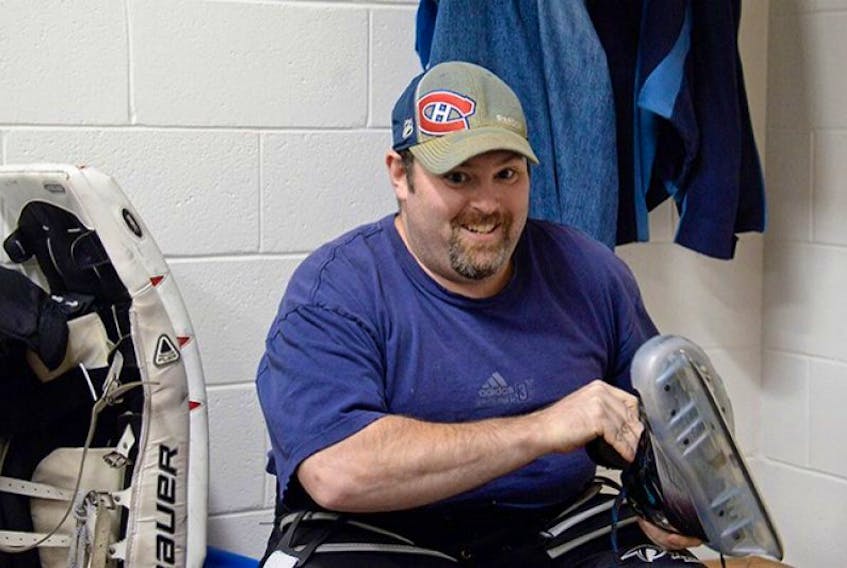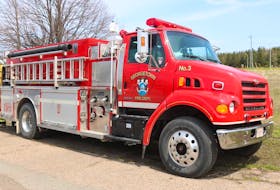Three years ago, Mike Thomson jumped between the pipes after a roughly 15-year hiatus from hockey.
He doesn’t sugar coat his physical condition at the time that he got the itch to play again.
“Horrible,’’ said the 38-year-old Stratford man.
Standing at five feet and eight inches, the burly goaltender weighed 255 pounds (he has shaved about 20 pounds since).
“I pretty much just jumped right back in,’’ he said.
“I felt great after the first game until about two days later, than it hurt to move.’’
In his early games back to a sport he had stopped playing at age 20, the level of conditioning - or lack thereof - was very evident.
Each time there was a flurry around his net he would get shortness of breath.
Thomson says he plays on the Churchill Arms in a primarily 40-plus gentlemen’s league for the fun. The health aspect is simply an added bonus when he gets in the net twice a week for 50-minute games.
The University of Ottawa Heart Institute, however, strongly advises getting in shape to play hockey rather than playing hockey to get in shape.
Every year, hockey players across Canada suffer heart attacks and other heart related events that could often be prevented if players made sure to prepare responsibly for the game.
“Ice hockey is a great sport to stay in shape and enjoy great time with friends, but ignoring the stress it puts on the heart and not taking the appropriate actions to play safe can lead to serious, sudden cardiac events,’’ said Dr. Andrew Pipe, chief of the division of prevention and rehabilitation at the Ottawa Heart Institute.
“Players should know, and address, their risk factors and work as a team with their physicians as necessary to effectively avoid unfortunate incidents.’’
Thomson’s teammate Mike Hunter, 42, of Charlottetown lost a good friend last month when popular sport physiotherapist Ralph Manning died of a heart attack after playing a recreational hockey game in Cornwall.
“It’s always in the back of our minds,’’ Hunter said of running into trouble with the old ticker while playing hockey.
He has had his share of moments where a bit too much exertion on the ice has had his heart pounding heavily while also experiencing shortness of breath.
Shawn Shea sees the importance of being in good shape before lacing up for the first game of the recreational hockey season.
A marathon runner, the 58-year-old Stratford resident has never had any serious health issue.
He has, though, seen other players panting and gasping for air, reinforcing the importance of being in shape before taking to the rink.
“You do see some folks that you know are really laboring,’’ he said.
“It makes you wonder about the potential of folks taking cardiac arrest or something.’’
Physicians with the emergency department at the Queen Elizabeth Hospital say each year they would see a few individuals come in experiencing cardiac issues while playing recreational hockey.
P.E.I. cardiologist Dr. Alex MacLean urges players experiencing chest pain or discomfort to immediately get off the ice and seek medical attention.
If there is even an inkling of a heart attack, err on the side of caution: call 911.
MacLean, who is a spokesman for the Heart and Stroke Foundation of P.E.I., also advises hockey players to start slow and gradually work their way into game shape.
This advice, he adds, is applicable to any sport, from a player starting his or her soccer season to an individual getting back on the squash court.
Three years ago, Mike Thomson jumped between the pipes after a roughly 15-year hiatus from hockey.
He doesn’t sugar coat his physical condition at the time that he got the itch to play again.
“Horrible,’’ said the 38-year-old Stratford man.
Standing at five feet and eight inches, the burly goaltender weighed 255 pounds (he has shaved about 20 pounds since).
“I pretty much just jumped right back in,’’ he said.
“I felt great after the first game until about two days later, than it hurt to move.’’
In his early games back to a sport he had stopped playing at age 20, the level of conditioning - or lack thereof - was very evident.
Each time there was a flurry around his net he would get shortness of breath.
Thomson says he plays on the Churchill Arms in a primarily 40-plus gentlemen’s league for the fun. The health aspect is simply an added bonus when he gets in the net twice a week for 50-minute games.
The University of Ottawa Heart Institute, however, strongly advises getting in shape to play hockey rather than playing hockey to get in shape.
Every year, hockey players across Canada suffer heart attacks and other heart related events that could often be prevented if players made sure to prepare responsibly for the game.
“Ice hockey is a great sport to stay in shape and enjoy great time with friends, but ignoring the stress it puts on the heart and not taking the appropriate actions to play safe can lead to serious, sudden cardiac events,’’ said Dr. Andrew Pipe, chief of the division of prevention and rehabilitation at the Ottawa Heart Institute.
“Players should know, and address, their risk factors and work as a team with their physicians as necessary to effectively avoid unfortunate incidents.’’
Thomson’s teammate Mike Hunter, 42, of Charlottetown lost a good friend last month when popular sport physiotherapist Ralph Manning died of a heart attack after playing a recreational hockey game in Cornwall.
“It’s always in the back of our minds,’’ Hunter said of running into trouble with the old ticker while playing hockey.
He has had his share of moments where a bit too much exertion on the ice has had his heart pounding heavily while also experiencing shortness of breath.
Shawn Shea sees the importance of being in good shape before lacing up for the first game of the recreational hockey season.
A marathon runner, the 58-year-old Stratford resident has never had any serious health issue.
He has, though, seen other players panting and gasping for air, reinforcing the importance of being in shape before taking to the rink.
“You do see some folks that you know are really laboring,’’ he said.
“It makes you wonder about the potential of folks taking cardiac arrest or something.’’
Physicians with the emergency department at the Queen Elizabeth Hospital say each year they would see a few individuals come in experiencing cardiac issues while playing recreational hockey.
P.E.I. cardiologist Dr. Alex MacLean urges players experiencing chest pain or discomfort to immediately get off the ice and seek medical attention.
If there is even an inkling of a heart attack, err on the side of caution: call 911.
MacLean, who is a spokesman for the Heart and Stroke Foundation of P.E.I., also advises hockey players to start slow and gradually work their way into game shape.
This advice, he adds, is applicable to any sport, from a player starting his or her soccer season to an individual getting back on the squash court.
TOP 5 WAYS TO REDUCE THE RISK
Here are five tips for hockey players to prepare responsibly for a game to reduce the risk of suffering a heart attack or other heart related event:
1. Get in shape to play hockey, exercising at least three times per week year-round.
2. Everyone on the team should know how to respond to a sudden cardiac event on the ice or bench. Quick reaction time is key.
3. Always know the location of the closest automated external defibrillator (AED) in the arena.
4. Always make sure to have a cell phone on the bench.
5. Know and address your heart risks, such as smoking and having a family history of heart disease.
Source: University of Ottawa Heart Institute









